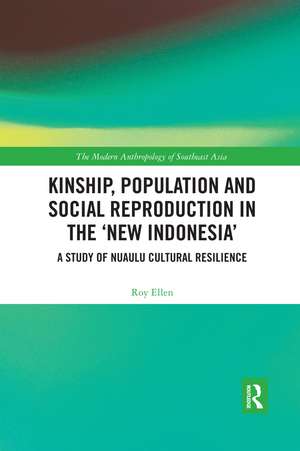Kinship, population and social reproduction in the 'new Indonesia': A study of Nuaulu cultural resilience: The Modern Anthropology of Southeast Asia
Autor Roy Ellenen Limba Engleză Paperback – 14 aug 2020
This book examines how kinship organization and marriage patterns have responded to some of these challenges, and suggests that the retention of core institutions of descent and exchange are the consequence of population growth, which in turn has enabled ritual reproduction, and thereby effectively maintained a distinct identity in relation to the surrounding majority culture. Low conversion rates to other religions, and the political consequences of Indonesian ‘reformasi’, have also contributed to a situation in which, despite changes in the material basis of their lives, Nuaulu have projected a strong independent identity and organisation. In terms of debates around kinship in eastern Indonesia, this book argues that older notions of prescriptive social structure are fundamentally flawed. Kinship institutions are real enough, but the distinction between genealogical and classificatory relations is often unimportant; all that matters in the end is that the arrangements entered into between clans and houses permit both biological and social reproduction, and that the latter ultimately serves the former.
An important contribution to the study of the peoples of Eastern Indonesia, it highlights a 'good news story' about the successful retention of a traditional way of life in an area that has had a troubled recent history. It will be of interest to academics in various fields of anthropology, in particular the study of kinship and Southeast Asian societies.
| Toate formatele și edițiile | Preț | Express |
|---|---|---|
| Paperback (1) | 384.86 lei 6-8 săpt. | |
| Taylor & Francis – 14 aug 2020 | 384.86 lei 6-8 săpt. | |
| Hardback (1) | 1001.07 lei 6-8 săpt. | |
| Taylor & Francis – 31 mai 2018 | 1001.07 lei 6-8 săpt. |
Preț: 384.86 lei
Nou
Puncte Express: 577
Preț estimativ în valută:
73.64€ • 77.11$ • 61.08£
73.64€ • 77.11$ • 61.08£
Carte tipărită la comandă
Livrare economică 09-23 aprilie
Preluare comenzi: 021 569.72.76
Specificații
ISBN-13: 9780367590581
ISBN-10: 0367590581
Pagini: 236
Dimensiuni: 156 x 234 x 13 mm
Greutate: 0.34 kg
Ediția:1
Editura: Taylor & Francis
Colecția Routledge
Seria The Modern Anthropology of Southeast Asia
Locul publicării:Oxford, United Kingdom
ISBN-10: 0367590581
Pagini: 236
Dimensiuni: 156 x 234 x 13 mm
Greutate: 0.34 kg
Ediția:1
Editura: Taylor & Francis
Colecția Routledge
Seria The Modern Anthropology of Southeast Asia
Locul publicării:Oxford, United Kingdom
Public țintă
PostgraduateCuprins
1. Introduction 2. Clans, history and the emergence of the Nuaulu ethnos 3. Descent, duality and gender 4. Houses, networks and the practices of kinship 5. Language and the social cognition of relationality 6. Marriage 1: exchange, process and transaction 7. Marriage 2: matrilaterality, bilaterality and alliance 8. Rules, contravention and enforcement 9. Demography, change and social reproduction
Notă biografică
Roy Ellen is Emeritus Professor of Anthropology and Human Ecology at the University of Kent. His recent books include On the Edge of the Banda Zone (2003) and Nuaulu Religious Practices (2012). He was elected to a fellowship of the British Academy in 2003, and was President of the Royal Anthropological Institute between 2007 and 2011.
Descriere
Descriere de la o altă ediție sau format:
This book examines how kinship organization and marriage patterns have responded to challenges, and suggests that the retention of core institutions of descent and exchange are the consequence of population growth, which has enabled ritual reproduction, and thereby maintained a distinct identity in relation to the surrounding majority culture.
This book examines how kinship organization and marriage patterns have responded to challenges, and suggests that the retention of core institutions of descent and exchange are the consequence of population growth, which has enabled ritual reproduction, and thereby maintained a distinct identity in relation to the surrounding majority culture.













